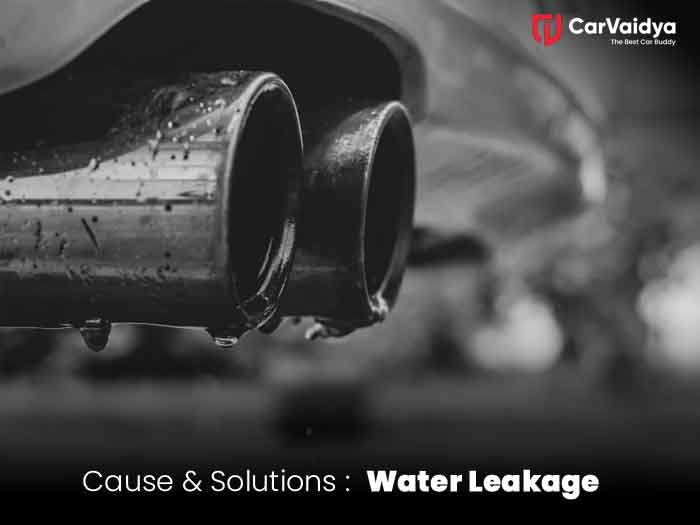Automobiles have become an indispensable part of our daily lives, providing convenience and efficiency in transportation. However, like any complex machinery, cars can encounter various issues, one of which is water leakage from the car silencer. While it might seem unusual, this problem can lead to several complications and affect the vehicle's performance. In this article, we will explore the causes behind water leakage from the car silencer and discuss potential solutions to address this concern.
Causes of Water Leakage
Condensation
One common cause of water leakage from the car silencer is condensation. When the engine is running, hot exhaust gases pass through the exhaust system, including the silencer. As these hot gases come into contact with the cooler walls of the silencer, moisture in the exhaust gas can condense and form water droplets. Over time, this water can accumulate and eventually lead to leakage.
Fuel Combustion Byproducts
Another source of water in the exhaust system is the combustion of fuel. During the combustion process, hydrocarbons in the fuel combine with oxygen to produce carbon dioxide and water vapor. If the exhaust system is not able to expel these byproducts effectively, water can condense within the silencer and cause leakage.
Short Trips
Cars that are used predominantly for short trips may be more prone to water leakage from the silencer. In such cases, the exhaust system may not reach a temperature high enough to evaporate the condensed water completely. Over time, this accumulated water can corrode the silencer and lead to leakage.
Cool Weather Conditions
Cold weather can exacerbate the condensation issue. In colder climates, the temperature difference between the hot exhaust gases and the ambient air is more significant, leading to faster condensation within the silencer. This increased condensation can contribute to water leakage.
Complications Arising from Water Leakage
Corrosion
One of the primary concerns associated with water leakage from the car silencer is corrosion. The accumulated water, combined with the corrosive elements in the exhaust gases, can lead to the formation of rust inside the silencer. This corrosion weakens the structure of the silencer and may eventually result in perforation, causing further damage.
Reduced Exhaust Efficiency
Water leakage can hinder the proper functioning of the exhaust system. The presence of water in the system may disrupt the flow of exhaust gases, reducing the efficiency of the exhaust system. This can lead to decreased engine performance, increased fuel consumption, and even affect emissions.
Increased Noise Levels
Corrosion and perforation caused by water leakage can alter the acoustics within the silencer. This may result in increased noise levels during the operation of the vehicle. Unwanted noise can be not only annoying but also an indication of underlying issues that need attention.
Solutions to Address Water Leakage
Regular Maintenance
Regular maintenance of the exhaust system is crucial to prevent water leakage. Periodic inspections by a qualified mechanic can help identify any issues early on and address them before they escalate. Cleaning and maintaining the entire exhaust system can also contribute to its longevity.
Extended Drives
If possible, try to incorporate longer drives into your routine. Longer trips allow the exhaust system to reach higher temperatures, promoting the evaporation of condensed water within the silencer. This can be particularly beneficial for vehicles predominantly used for short trips.
Exhaust System Insulation
Insulating the exhaust system, especially the silencer, can help maintain higher temperatures within the system. This insulation minimizes the temperature difference between the exhaust gases and the surrounding air, reducing the likelihood of condensation and water leakage.
Quality Fuel
The quality of fuel used can impact the byproducts of combustion. Using high-quality fuel with lower impurities can result in cleaner exhaust gases, reducing the likelihood of water condensation within the silencer.
Rust Prevention
Applying rust-preventive coatings to the exterior of the silencer can help protect it from corrosion. These coatings create a barrier that inhibits the formation of rust, extending the lifespan of the silencer and minimizing the risk of water leakage.
Conclusion
Water leakage from the car silencer might initially seem like a minor issue, but its consequences can be significant if left unaddressed. Regular maintenance, awareness of driving habits, and implementing preventive measures can go a long way in mitigating the risks associated with water leakage. By understanding the causes and adopting proactive solutions, car owners can ensure the longevity and optimal performance of their vehicles.
You Can Read Some Other Articles
Essential Car Steering Tips Common Mistakes to Avoid While Driving
Tips for Choosing the Right Car Loan What To Consider
Understanding and Addressing Issues With Spark Plugs In Cars


0 Comments